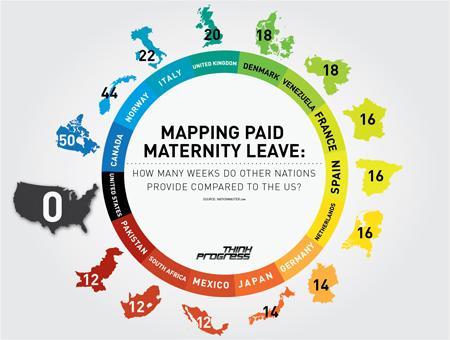Out of the 178 nations in the world, the United States is one of three that does not provide paid maternity leave for new mothers (the other two countries are Papua New Guinea and Swaziland). There are even fewer countries in the world that provide the option for paid paternity leave as well, placing a different set of burdens and stereotypes on both new mothers and fathers.
This becomes a problem when considering how dependent families are on both the father and mother’s incomes. Forbes quotes a study from the Center for American Progress, noting that “in 2010, among families with children, 49% were headed by two working parents and 26% by single parents”. The article followed up these statistics with the fact that “in 2009, employed wives of dual-earner families contributed 47% of family earnings”. In the past, the man of the household used to provide well over the majority of family income, but now men and women provide for their families equally. Times are changing, and our laws should be changing along with it.

To me, the importance of paid parental leave is about having options and equality between men and women. If a girl dreams of being a stay-at-home-mom, that’s great, and if she hopes to have children and a job, that’s great too. If her husband wants to be a stay-at-home-dad, that should be acceptable as well. Without paid parental leave, women (and men) don’t have those kinds of options. Only around half of women who have just had children are able to take paid maternity leave, but with a lack of a national law guaranteeing it, many women are left having to choose between caring for their newborn and receiving a steady income.

In the United States, paid maternity leave has not been implemented in part because businesses think it will be an added cost to them. Both California and New Jersey have good case studies for this point, because they provide paid maternity leave for “birth, adoption, foster placement or leave to care for a sick immediate-family member”, according to The Working Mother. Each state has found that the cost of these programs is minimal, taking only a few pennies or dollars out of an employee’s monthly salary, and the benefits have been more than expected. As the Working Mother article explains, “in California, 60 percent of employers surveyed said they saved money because employees used state family leave instead of employer-aid sick leave, vacation time or disability benefits”. Paid maternity leave clearly benefits not just parents, but businesses as well.
While paid maternity leave would be a definite step in the right direction, establishing a general paid parental leave – where one of the two parents decides to stay home – would be more ideal. Maternity leave alone creates assumptions of the roles of both mother and father: after having children a mother’s work must be compromised to take care of her kids, while the father has to work even harder to financially support his family (even if it sometimes means spending less time with them). This kind of family dynamic is reminiscent of the 1950’s and isn’t applicable to the 21st century.

I’ve observed families that are close to me in which the mom wants to be the breadwinner of the family and the dad wants to stay home and spend more time with his kids, but our current laws are preventing both sexes from doing that. In a society where it’s more and more common for couples to combine their last names after marriage (even Beyoncé and Jay-Z combined their last names to be Knowles-Carter), traditional family roles are clearly changing, and America’s laws aren’t acknowledging this. In order to do so, I truly believe that paid parental leave would be taking a step in the right direction.
To learn more, here are the articles I used for this post:
http://www.theatlantic.com/sexes/archive/2013/02/the-family-and-medical-leave-act-at-20-still-necessary-still-not-enough/272605/
http://thinkprogress.org/health/2012/05/24/489973/paid-maternity-leave-us/?mobile=nc
http://www.forbes.com/sites/work-in-progress/2012/05/23/3-reasons-why-card-carrying-capitalists-should-support-paid-family-leave/3/
http://www.workingmother.com/best-companies/everyone-us-state-maternity-leave

